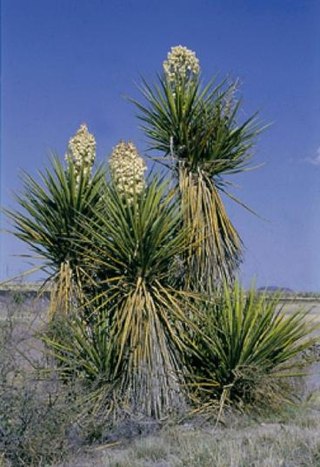The Prodoxidae are a family of moths, generally small in size and nondescript in appearance. They include species of moderate pest status, such as the currant shoot borer, and others of considerable ecological and evolutionary interest, such as various species of "yucca moths".

Hesperoyucca whipplei, the chaparral yucca, our Lord's candle, Spanish bayonet, Quixote yucca or foothill yucca, is a species of flowering plant closely related to, and formerly usually included in, the genus Yucca. It is native to southwest communities of North America.

Yucca filamentosa, Adam's needle and thread, is a species of flowering plant in the family Asparagaceae native to the southeastern United States. Growing to 3 metres tall, it is an evergreen shrub valued in horticulture.

Tegeticula yuccasella, the yucca moth, is a moth of the family Prodoxidae. The species was first described by Charles Valentine Riley in 1872. It can be found in North America from Texas to southern Canada.

Yucca faxoniana is a bladed evergreen shrub of the genus Yucca. It is known by the common names Faxon yucca,Spanish dagger, and giant dagger.

Prodoxus is a genus of moths of the family Prodoxidae. The members of this genus are known as bogus yucca moths.
Tegeticula tehuacana is a moth of the family Prodoxidae. It is found in Mexico in Oaxaca, western- and south-western Veracruz, and central-northern Puebla centred on the Tehuacan Valley.
Tegeticula baja is a moth of the family Prodoxidae. It is found in Mexico on the Baja California Peninsula.
Tegeticula mexicana is a moth of the family Prodoxidae. It is found in the United States in Texas, New Mexico and in Mexico. The habitat consists of desert flats and low slopes in the Chihuahuan Desert and open shrubland and grassland in coastal regions.
Tegeticula maculata is a moth of the family Prodoxidae. It is found in North America in central-southern cismontane California, in the Sierra Nevada north to Fresno County, in north-western Arizona, and from Baja California Norte to the Vizcaino region. The habitat consists of coastal chaparral and montane dry shrubby grassland.
Tegeticula synthetica is a moth of the family Prodoxidae. It is found in the United States in the Mojave Desert in southern Nevada, south-eastern California and from south-western Utah to north-western Arizona. The habitat consists of desert areas.
Tegeticula intermedia is a moth of the family Prodoxidae. Along with other moth species, it is commonly known as a yucca moth. T. intermedia lives in North America, particularly the United States. The moth resides in the southwest, the Great Plains, the Southeast, and mid-Atlantic. It also has been found much farther north in regions of Canada like Ontario and Alberta. There are also notable populations present in New Mexico. Their habitats are diverse and vary in terms of climate, landscape, and other factors. The moth lives in sand dunes, forests, glades, grassland, desert, and forests from the East Coast to the Southwest. Yucca moths have developed a strong mutualism with the yucca plant, such that both depend on each other for survival. The yucca moths and yucca plants have coevolved over millions of years. However, Tegeticula intermedia differs from most yucca moths in that it exhibits cheating behavior by laying eggs without pollinating the yucca plant.
Tegeticula baccatella is a moth of the family Prodoxidae. It is found in the United States in Arizona and New Mexico and adjacent regions of California, Nevada, Utah and Colorado. It is also found in western Texas. The habitat consists of shrub desert, rocky hillsides and open pine forests with outcrops.
Tegeticula rostratella is a moth of the family Prodoxidae. It is found in the Big Bend region of the United States, south to the Mapimí region in southern Coahuila in Mexico. The habitat consists of scrub desert.
Tegeticula superficiella is a moth of the family Prodoxidae. It is found in the United States in south-western Utah and northern Arizona. The habitat consists of shrub desert and open pine forests.
Tegeticula corruptrix is a moth of the family Prodoxidae. It is found in North America in south-western California, Arizona, New Mexico, northern Coahuila, western and southern Texas, Colorado, Alberta, the western plains of Nebraska, Wyoming and Montana.
Tegeticula cassandra is a moth of the family Prodoxidae. It is found in the United States in north-central Florida and bordering areas of Georgia. The habitat consists of open pine and pine-oak forests and open grassy areas with oak scrub.
Tegeticula antithetica is a species of moth in the family Prodoxidae. It is found in the Mojave Desert of the North American southwest, specifically southern California, southern Nevada, southwestern Utah, and western Arizona.

Yucca flaccida, commonly called Adam's needle or weak-leaf yucca, is a species of flowering plant in the asparagus family (Asparagaceae). It is native to south-central and southeastern North America, from the lower Great Plains eastward to the Atlantic seaboard in Virginia, south through Florida and the Gulf states. Its natural habitat is in sandy open woodlands and fields. It is not considered to be threatened by the IUCN.

Yucca arkansana, the Arkansas yucca, is a plant in the family Asparagaceae, native to Texas, Oklahoma, Arkansas, Missouri and Kansas. It generally grows in gravelly, sunlit locations such as rocky outcrops, prairies, etc. It is not considered to be threatened.







